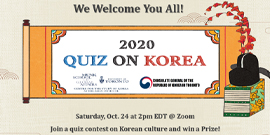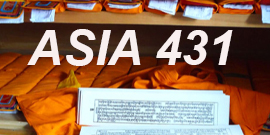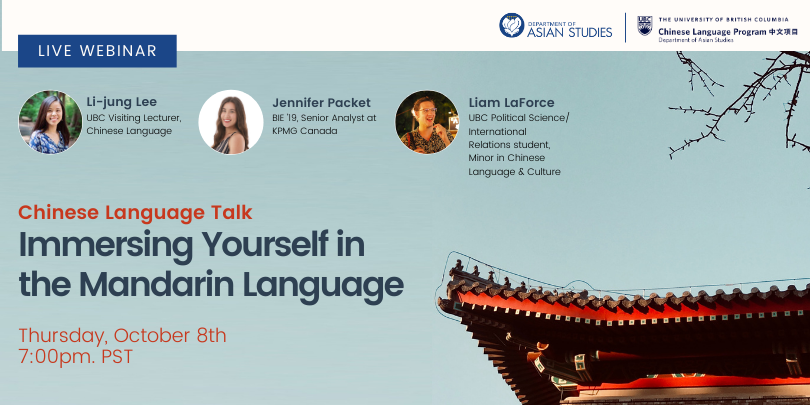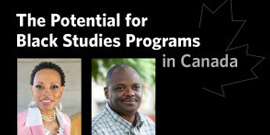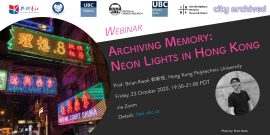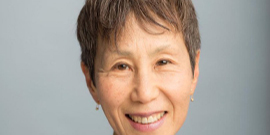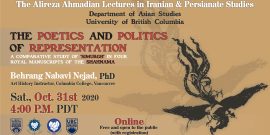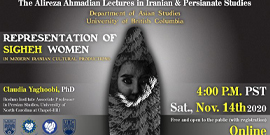
October 19, 2020 The Update is a regular roundup of news in the Department of Asian Studies for our Students, Faculty and Staff |
|
||||||||||||
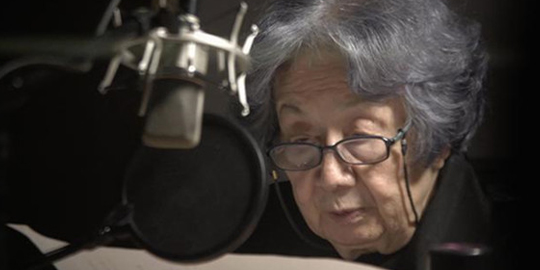 |
||||||||||||
|
Retired Asian Studies Professor Florence Yeh Featured in New Feature Documentary Retired UBC Asian Studies Professor, Florence Yeh Chia-ying, now aged ninety-six and based in China, is the subject of a brand-new feature documentary which opened recently in Shanghai, and premiered nationwide on October 16. The documentary focuses on her lifelong dedication to Chinese traditional literature and poetry, as well as her great contribution and unyielding spirit regardless of wars, social turmoil and family tragedy. "Heaven uses a hundred misfortunes to fashion one poet; I think you must have experienced such tribulations before you can understand the poems thoroughly," Professor Yeh says in the film. A graduate of the Department of Chinese Literature of Fu Jen Catholic University in Hong Kong in 1945, Professor Yeh worked as an educator, traditional Chinese literature researcher and writer. During the 1960s, she taught traditional Chinese poetry in English at Harvard University and Michigan State University, before settling in Vancouver in 1969. Many of our current and retired faculty remember her fondly, including sitting in on her classes in the 1970s and 1980s, and attending her 90th birthday celebration. |
||||||||||||
|
||||||||||||
| UPCOMING VIRTUAL EVENTS | ||||||||||||
|
||||||||||||
| SPOTLIGHT: Haoyue Li |
|
|
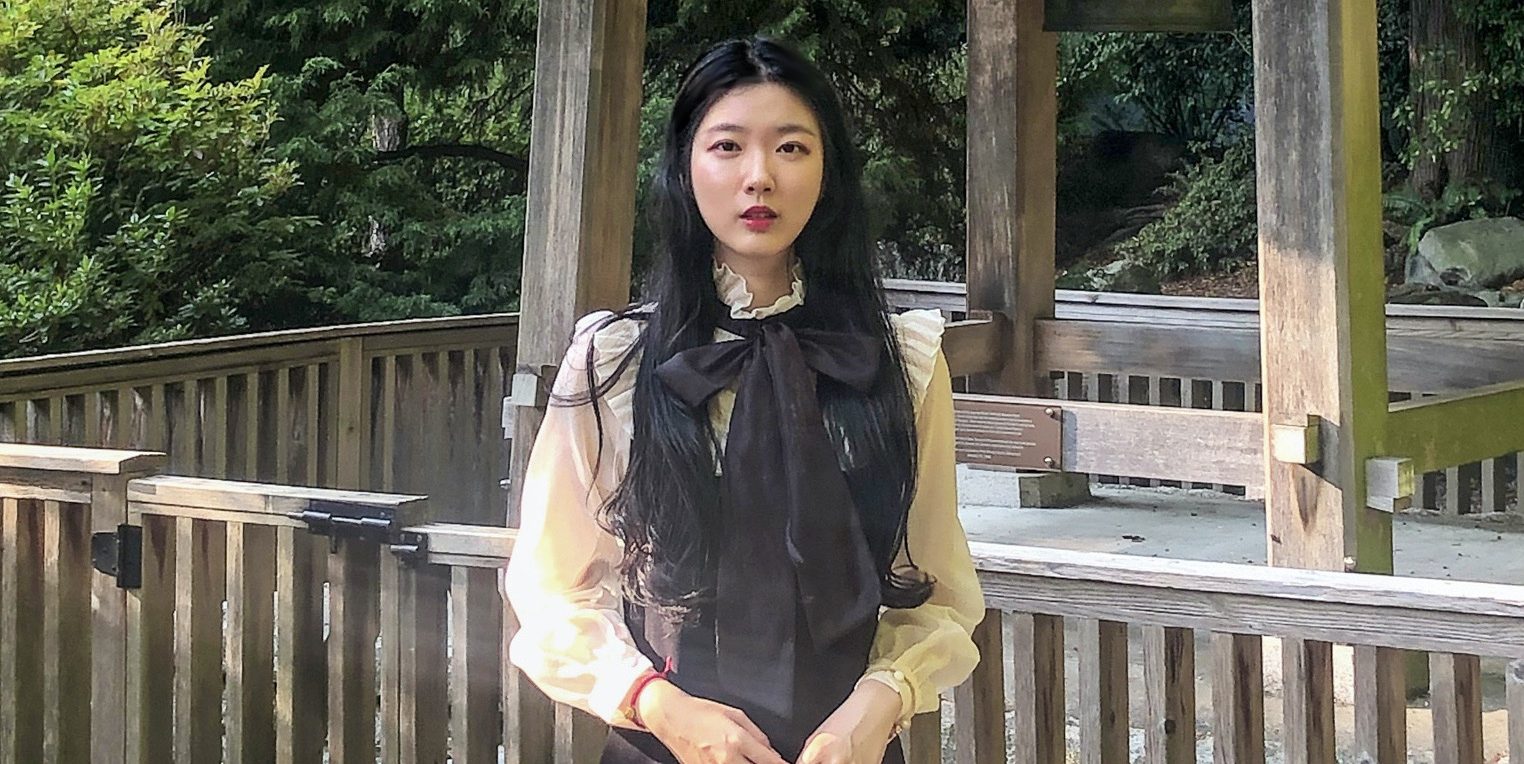 |
|
Interested in what you can do with a degree in Asian Studies? In our Spotlight Interview Series, we ask our students, postdocs and alumni about their career paths, how they became interested in Asian Studies and for any advice they would give to current students. In this interview, alumni Haoyue Li looks back on her MA experience and forward to her PhD and explains how her childhood pastime and nostalgia for home inspired her research topic today. Tell us a little about yourself, your background and how you became interested in Asian languages and cultures? After taking a BA (2014-2018) and MA (2018-2020) degree in the Department of Asian Studies, I am now starting my doctoral study under the supervision of Professor Alison Bailey. My interest in premodern Chinese fiction, drama and cultural history can be traced back to primary school, when reading premodern Chinese literary works after daily heavy coursework was the most delightful time for me. During my early undergraduate days, I took several courses of Chinese literature and history, as studying familiar texts helped me handle my nostalgia for my motherland. As I took more and more classes in the Asian Studies department, I realised that I love Chinese Studies, since I can feel them in my blood, and studying China’s past outside its geographical zone provides me with a more profound and critical visual angle to look anew at my cultural heritage. Could you explain to a non-expert what you are researching and why it is significant? My research focuses on odours, olfactory sensations, olfactory aesthetics, and olfactory culture in late-imperial Chinese literary works and historical texts. I believe this invisible and inaudible sensation deserves more attention, as there are many classical olfactory motifs, topoi, and symbols in premodern Chinese writings. These olfactory narrations demonstrate that there used to be particular historical moments when odours were often given specific cultural connotations, aesthetic and philosophical implications, and ideological messages. Meanwhile, odours provide another approach to (re)consider many well-studied literary works. For example, through taking the mid-eighteenth Chinese novel Story of the Stone, one of the “Six [Chinese] Classic Novels,” as the case study, my master’s thesis examines the mechanism of odours as both narrative technique and reading method, especially its significance in (re)constructing atmospheres, affects, theme, and fictional spaces in literary works. |
| OPPORTUNITIES |
 |
|
Organised by The International Academic Forum (IAFOR), ACEID2021 – which will be held both in-person in Tokyo, Japan and online from March 21 to 24, 2021 – encourages academics and scholars to meet and exchange ideas and views in an international forum stimulating respectful dialogue. This event will afford an exceptional opportunity for renewing old acquaintances, making new contacts, networking, and facilitating partnerships across national and disciplinary borders. It is currently accepting abstract submissions for papers from a wide variety of interdisciplinary and theoretical perspectives; the early bird submission deadline is October 30. For more information on submission guidelines, please visit the ACEID2021 website. The Bhagavan Shitalnath Post-Doctoral Fellowship in Jain Studies The Department of Historical Studies at the University of Toronto invites applications for the Bhagavan Shitalnath Post-Doctoral Fellowship in Jain Studies. The appointment will begin February 1, 2021 and is for a period of 3 years. Candidates working in any field of Jain Studies are encouraged to apply. The successful applicant will have demonstrated expertise in one or more research languages and be able to work with primary source archives. While the primary responsibility of the postdoctoral fellow is research, the fellow will also be involved in planning an annual Jain Studies Summer School and will help foster intellectual community at the University of Toronto Mississauga. The position also includes the teaching of one 12-week course per academic year. Applicants must have successfully defended their doctoral theses by the commencement of the post, and no earlier than 2016. Applicants may be citizens of any country, and graduates from any university. The application deadline is November 1. For more information, please contact historical.studies@utoronto.ca. World Congress of Korean Language 2020: Video Contest for Korean Culture Education Hosted by the Ministry of Culture, Sports and Tourism, the first World Congress of Korean Language will be held as linguists from all over the world, educators, language engineers, industry officials and those interested in Korean will come together to discuss the future of Korean and Hangeul. They are also holding a video contest with awards and are calling for submissions on informative short videos on Korean culture to contribute to the promotion of the Korean language and culture. The deadline to submit your video is November 13. You may apply as an individual or in a group. For more information on the contest and submission guidelines, please contact the World Congress of Korean Language 2020 through their website contact form. University of Toronto East Asian Studies: Assistant Professor position The Department of East Asian Studies at the University of Toronto invites applications for a full-time tenure stream position in the area of Pre-modern East Asian cultural studies, with a focus on China, including the late imperial period. The appointment will be at the rank of Assistant Professor, with an expected start date of July 1, 2021. Applicants must have earned a Ph.D. degree in East Asian Studies or a related discipline by the time of appointment, or shortly thereafter, with a demonstrated record of excellence in research and teaching. The deadline for applications is November 19. For more information, see the posting or email eas.chair@utoronto.ca for further inquiries. University of Colorado, Boulder Graduate Student Conference: Call for Submissions The CU Boulder Asian Studies Graduate Association (CUBASGA) invites submissions for its annual graduate student conference, to be held remotely via Zoom on January 30 and 31, 2021. Current graduate students from across the US and around the world are encouraged to submit proposals on any aspect of Asian culture. The conference will include keynote addresses from two prominent scholars in Chinese and Japanese studies, Prof. Xiaofei Tian (Professor of Chinese Literature, Dept. of East Asian Languages and Civilizations, Harvard University) and Prof. Wiebke Denecke (Visiting Professor of East Asian Literatures, Massachusetts Institute of Technology). To apply, please submit a 300-word conference paper proposal and a resume to cubasga@colorado.edu by November 25. For inquiries, please email CUBASGA student administrators at cubasga@colorado.edu. Have an idea to support social connectedness during this time? The @utownubc community grant offers up to $1000 in funding for projects that foster community and capacity building from a distance. Applications are being accepted on a rolling deadline until Dec. 1, or once funding is fully subscribed. Members of the UBC and Musqueam communities, including students, residents, staff and faculty are welcome to apply. |
| ON & OFF-CAMPUS EVENTS |
 |
|
Spotlight on Hockey in North Korea: A Talk with Filmmaker Devan Francis October 29, 6:00pm October 29 - November 30 October 31 - November 8
|
|
||||
| This email is intended for . Unsubscribe |
